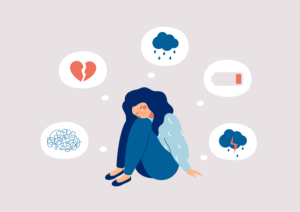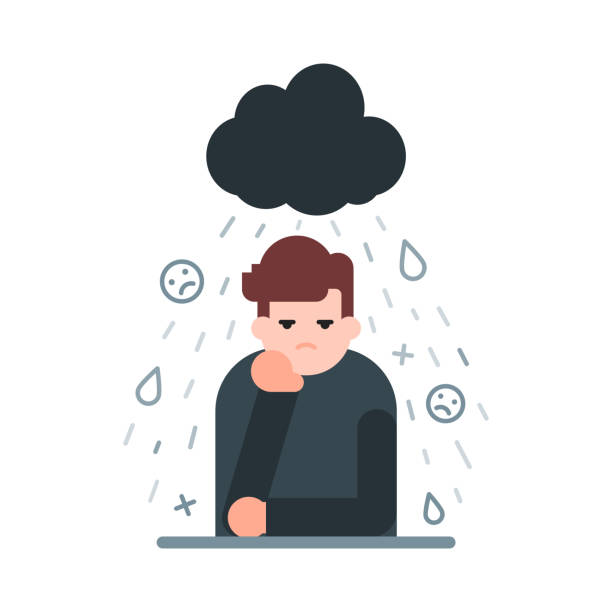Depression and anger are two of the most common emotions that people experience. Unfortunately, many people do not understand what these emotions are or how to deal with them. In this blog post, we will discuss the difference between depression and anger, as well as the signs and symptoms of each emotion. We will also provide advice on how to deal with depression and anger healthily.
Contents
Defining Anger
Anger is an emotion that is characterized by feelings of frustration, hostility, and aggression. Anger can be caused by a variety of things, including stress, anxiety, or even physical pain. When someone is feeling angry, they may experience a racing heart, clenched fists, and tense muscles. Anger is a natural emotion and it is not necessarily bad to feel angry. However, it is important to know how to deal with anger healthily.
Defining Depression
Depression, on the other hand, is an emotion that is characterized by feelings of sadness, hopelessness, and despair. Depression can be caused by a variety of things as well, including stress, anxiety, or even physical pain. When someone is feeling depressed, they may experience a loss of interest in activities, fatigue, and difficulty concentrating. Depression is a serious emotion and it can be very detrimental to someone’s mental and physical health if it is not dealt with healthily.
Link Between Depression And Anger

It is important to understand the difference between depression and anger so that you can healthily deal with each emotion.
Similarities
There are a few similarities between anger and depression.
- There is a strong link between depression and anger. Many people who are depressed also experience periods of anger. Research has shown that people who are depressed are more likely to lash out in anger than people who are not depressed. This is because depression can cause a person to feel overwhelmed and hopeless, which can lead to feelings of frustration and rage.
- For one, both emotions can be caused by a variety of things, including stress, anxiety, or physical pain.
- Additionally, both emotions can lead to physical symptoms, such as a racing heart or clenched fists.
- Anger symptoms can manifest in depression in various ways. Some people may become withdrawn and isolate themselves when they are feeling depressed and angry. Others may act out aggressively or violently.
- Finally, both emotions can be detrimental to someone’s mental and physical health if they are not dealt with healthily.
Differences

However, there are also some differences between anger and depression.
- One of the biggest differences is that anger is considered to be a natural emotion while depression is considered to be a serious emotion.
- Additionally, angry people may still experience positive emotions, such as happiness or love. People who are depressed may not experience any positive emotions.
- Anger is a common emotion that everyone experiences on a spectrum. Only in severe and unmanaged cases can it turn into a disorder. Whereas, depression is a disorder that characterizes by various symptoms which persist over a long period.
- Finally, anger is typically characterized by feelings of frustration, hostility, and aggression while depression is typically characterized by feelings of sadness, hopelessness, and despair.
Signs and Symptoms

Anger and depression manifest themselves in our body at psychological as well as physiological aspects.
Anger
Several signs and symptoms may indicate that someone is feeling angry or depressed. Some common signs and symptoms of anger include:
- Feeling irritated or easily annoyed
- Feeling like you could explode at any moment
- Physically acting out in aggression, such as hitting or throwing things
- Yelling or swearing
- Breaking things on purpose
Depression
Some common signs and symptoms of depression include:
- Feeling sad or hopeless most of the time
- Losing interest in activities that you used to enjoy
- Sleeping too much or not being able to sleep
- Feeling tired all the time
- Having difficulty concentrating
- Overeating or not eating enough
Both these conditions also share some common signs, such as:
- Feeling irritable
- Losing interest in activities
- Difficulty concentrating
- Hostility
- Guilt for no specific reason
- Sleeping too much or not being able to sleep
These conditions can also influence a person’s physiology. Some ways they manifest in our body include:
- A racing heart
- Clenched fists or teeth
- Stomachaches
- Low stamina
- Increase in sweating
- Restlessness
- Muscle tension
- Sleeping problems
- Tightness in the chest
- Headaches
- Body aches and pains.
If you are experiencing any of these signs and symptoms, it is important to seek help from a mental health professional. They will be able to assess your situation and provide you with the help that you need.
Effect On Daily Life
Both depression and anger can have a significant effect on someone’s daily life. Depression can make it difficult to get out of bed in the morning, go to work, or even take care of basic hygiene. Anger, on the other hand, can cause someone to lash out at others, say hurtful things, or act out in destructive ways. It is important to understand how to deal with both depression and anger in order to maintain a healthy and balanced life.
Depression and anger can also make it difficult to concentrate, sleep, or even eat. They can also lead to problems at work, school, or also in relationships. Some areas of life that can get affected by the signs of these conditions are:
- Social life
- Work or school performance
- Productivity around the house
- The ability to have healthy relationships
- Mental and physical health
Treatment

There are several different treatment options available for both depression and anger. They can either be through the help of a mental health professional or by adopting self-help tricks.
Professional Help
If you are feeling depressed or angry, it is important to seek professional help. A mental health professional will be able to assess your situation and further provide you with the help that you need. Some different types of professionals that can help include:
- Psychiatrists
- Psychologists
- Therapists
- Counselors
They can use either prescribed medication or therapy to manage these conditions.
Some common medicines used to treat depression and anger include tablets such as:
- Selective serotonin reuptake inhibitors (SSRIs)
- Serotonin and norepinephrine reuptake inhibitors (SNRIs)
- Tricyclic antidepressants (TCAs)
- Monoamine oxidase inhibitors (MAOIs)
Therapy is another common method that helps to treat these conditions. Some different types of therapy include techniques such as:
- Cognitive behavioral therapy (CBT)
- Dialectical behavior therapy (DBT)
- Interpersonal therapy (IPT)
- Psychodynamic therapy
Self Help Tips
In addition to clinical assistance, one can also make use of the following strategies to manage these conditions.
Get moving: Exercise has been an effective way of dealing with both depression and anger. Taking a brisk walk, going for a run, or even just dancing around your living room can help improve your mood and reduce feelings of frustration.
Talk about your feelings: It is important to express how you’re feeling, whether that’s through writing, talking to someone, or even just crying. Bottling up your emotions will only make them worse in the long run.
Deep breathing: Deep breathing helps to calm the body and mind. It is a simple way to relaxation and can be done anywhere.
Challenge yourself: Challenging yourself can help to increase self-esteem and confidence. It can also help to reduce boredom. You will also get to explore and understand your emotions and their intensity.
Set goals: Setting goals gives you a sense of purpose and something to work towards. Make sure they are realistic and achievable.
Change your diet: Eating healthy foods helps to improve mood and energy levels. Avoid processed foods, caffeine, and also alcohol as they can make symptoms worse.
Improve sleep hygiene: Getting enough sleep is important for overall health. Poor sleep can make mood swings worse. Try to establish a regular sleep schedule and stick to it as much as possible.
Set boundaries: Setting boundaries with people can help you to feel more in control of your life. This includes saying no when you need to and setting limits on what you are willing and able to do.
Identify triggers: Identifying what triggers your anger or depression can help you to avoid or manage them better.
Journaling: Writing down your thoughts and feelings can help to identify triggers for your emotions. It can also help to provide relief from negative feelings.
Be patient and mindful: Be patient with yourself as you work on managing your depression or anger. It takes time to make changes and see further results. Be mindful of your thoughts, feelings, as well as behaviors.
Conclusion
To conclude the above, it is important to remember that depression and anger are both treatable conditions. If you are experiencing either of these, it is important to seek professional help. There are also self-help tips that can be useful in managing symptoms. Be patient with yourself and make sure to stick with any treatment plan that you develop. Depression and anger do not have to control your life.
For more information, please contact MantraCare. Anger is a powerful emotion that is experienced by every individual at some point in their lives. If you have any queries regarding Online Anger Counseling experienced therapists at MantraCare can help: Book a trial Online therapy session


